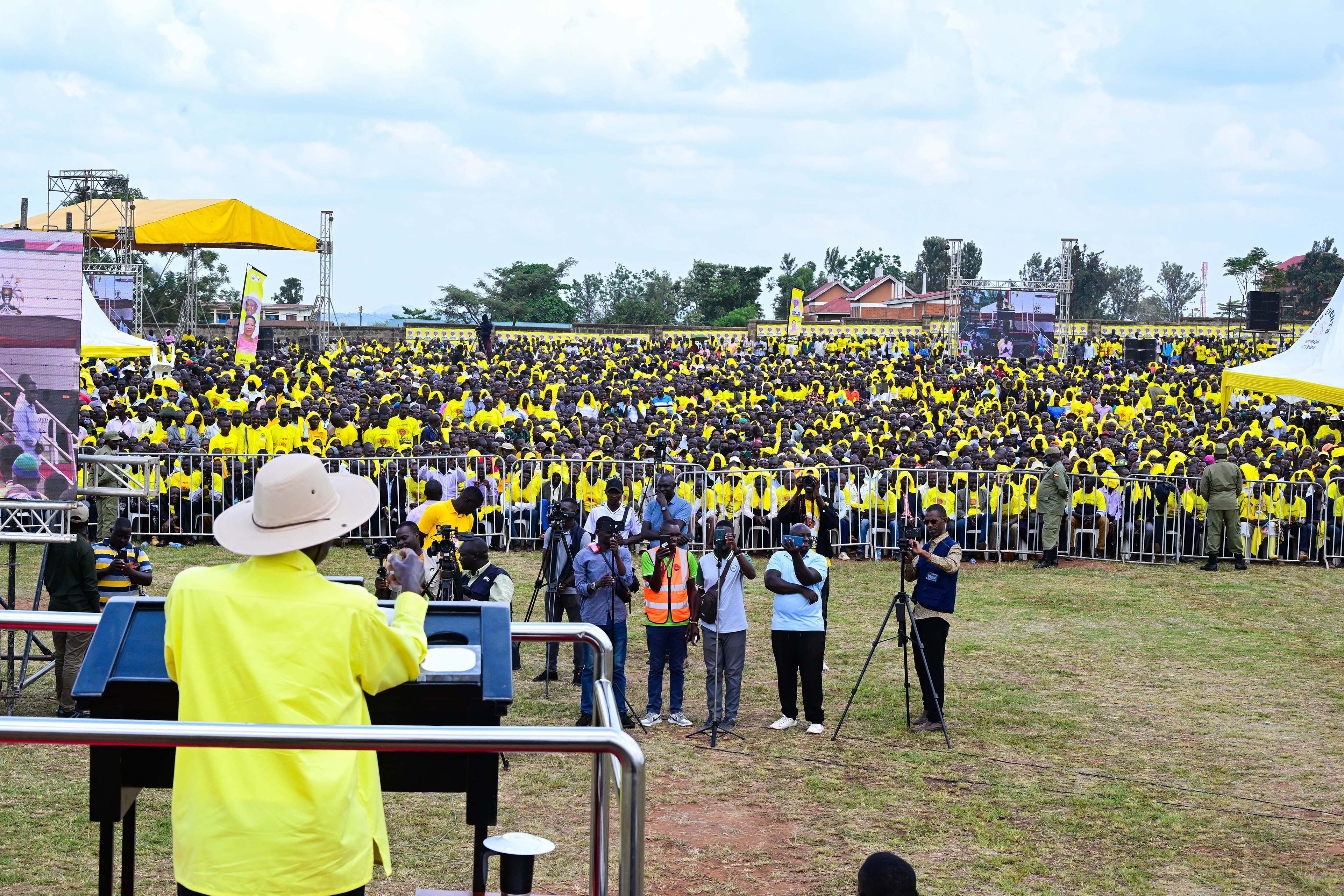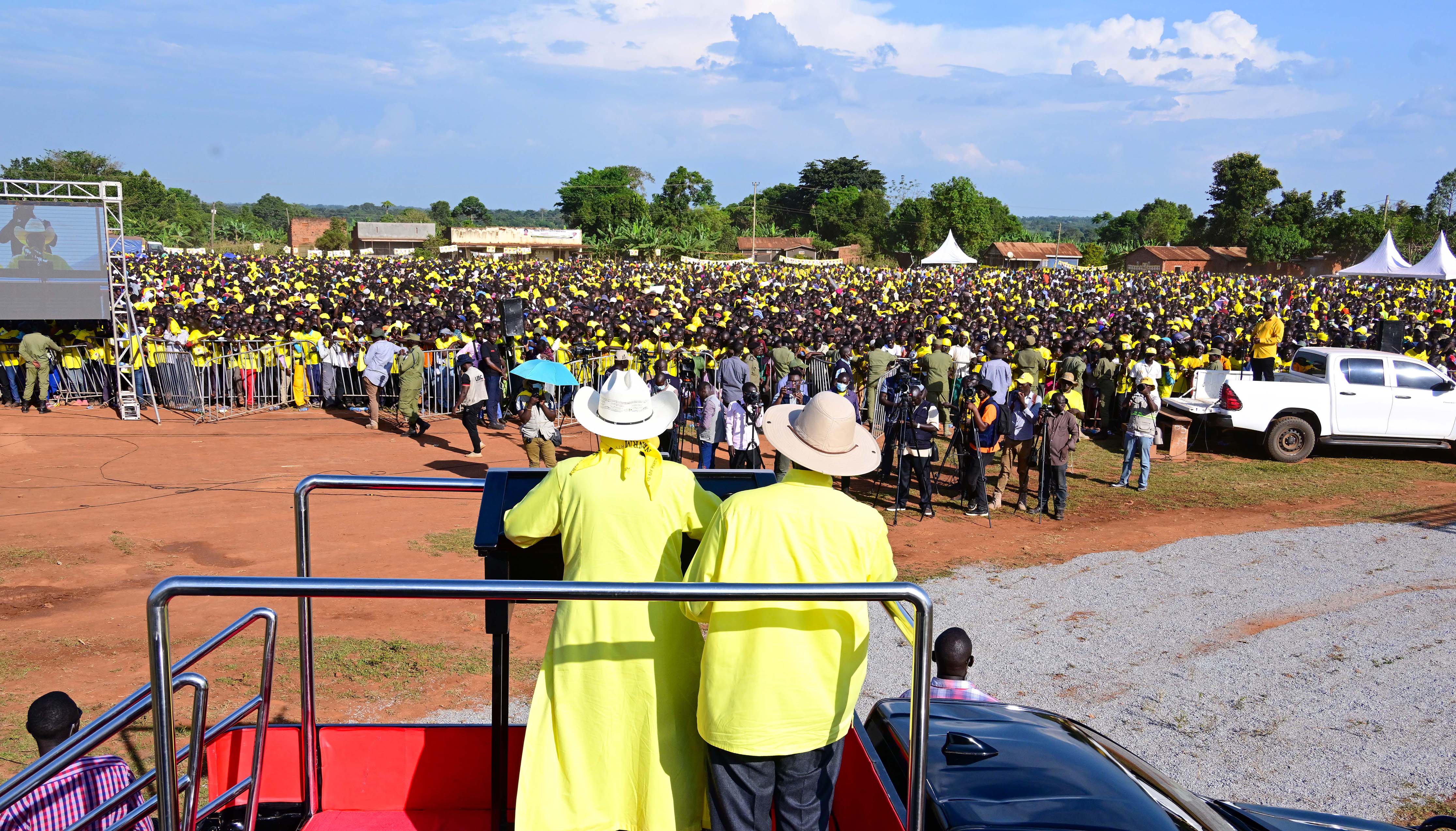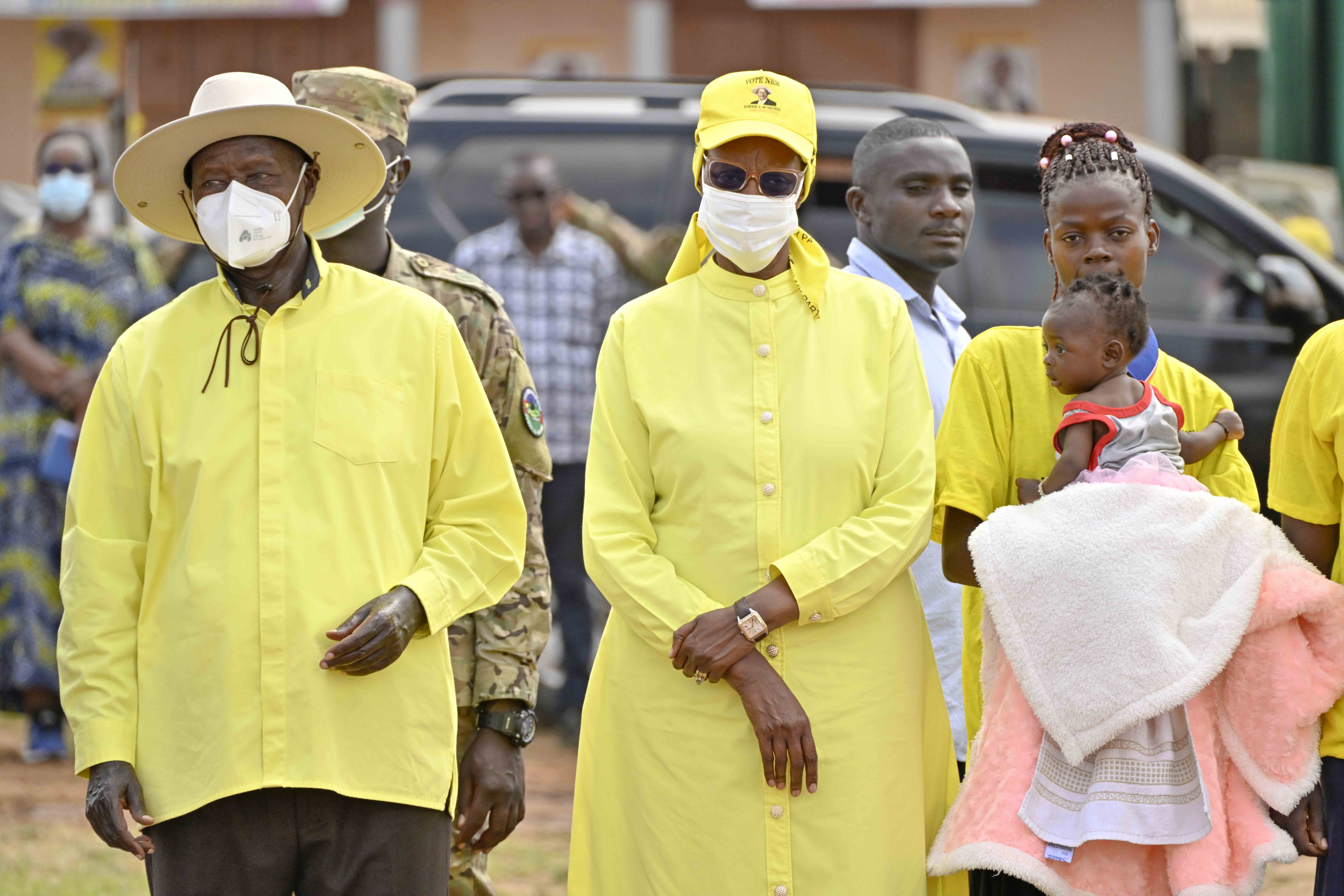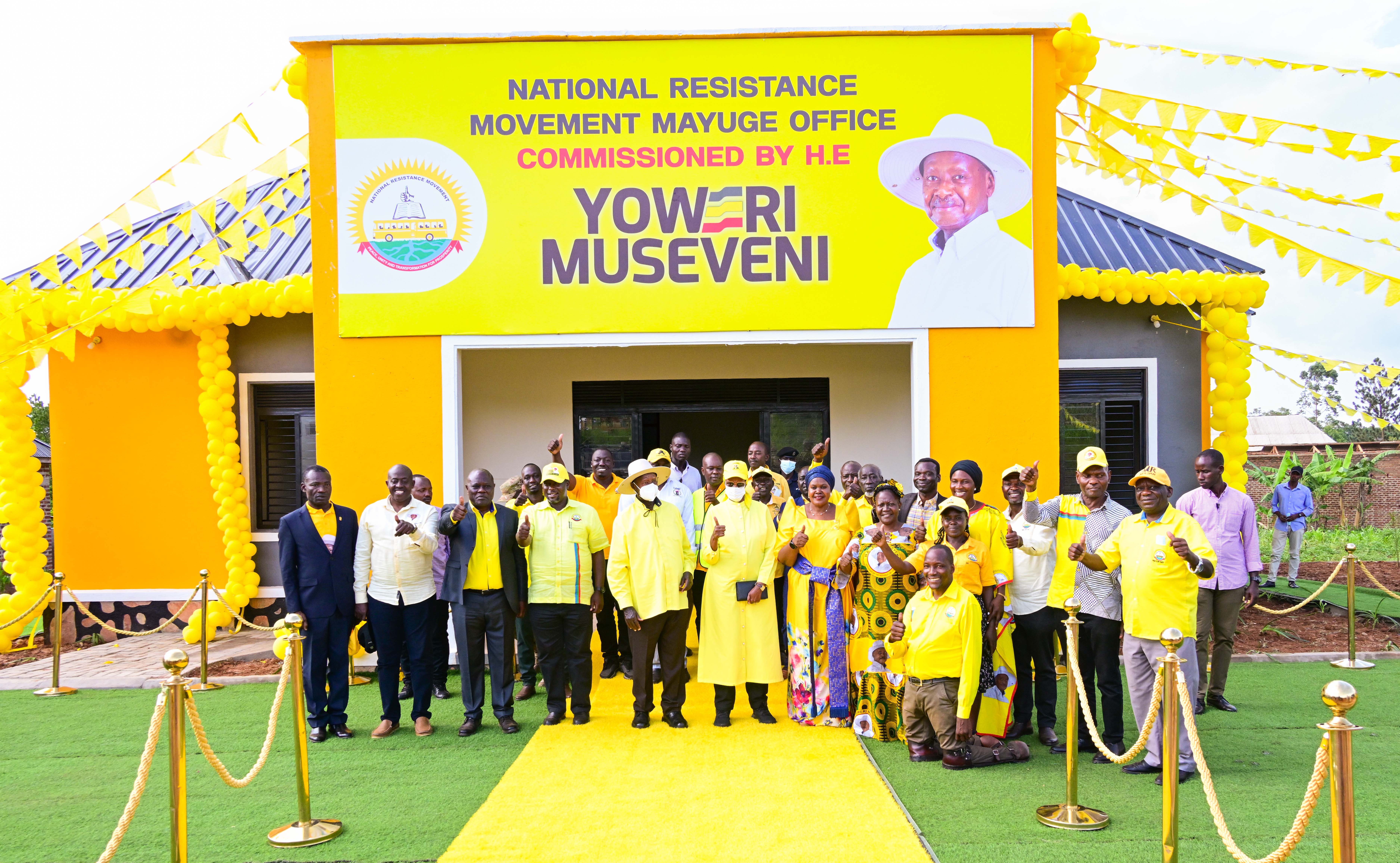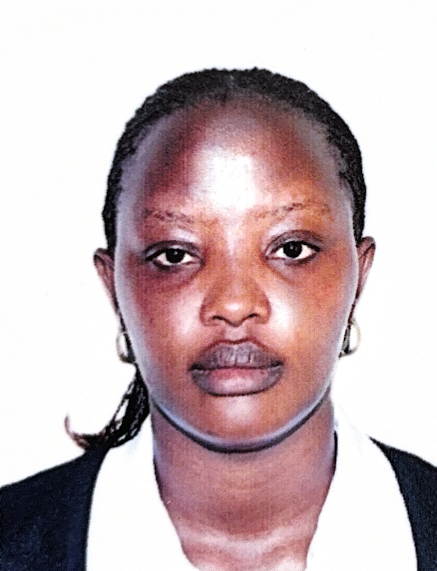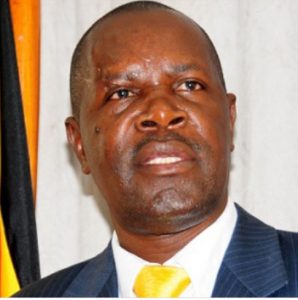
PRESIDENT MUSEVENI UNVEILS INDIVIDUALIZED WATER PLAN FOR WEALTH CREATORS IN KARAMOJA, PLEDGES MORE ROADS, SCHOOLS AND HOSPITALS
President Yoweri Kaguta Museveni has unveiled a new government initiative to establish individualized water systems aimed at supporting commercial farmers and small-scale producers, as part of a broader effort to eradicate poverty through wealth creation and self-sufficiency. Addressing thousands of supporters during a campaign rally at Kalas Girls Primary School in Amudat District, Karamoja Sub-region, on Tuesday 28th October, 2025, H.E. Museveni said the government was developing a plan to ensure every productive household has access to reliable water for production, a move he said would mark a turning point in Uganda’s rural transformation strategy. “We are working out a plan for water for rural areas. Apart from the valley dams, people need water at each home,” President Museveni said. “The communal water systems will not address their water problem. We are trying to analyze how we can provide individualized water for wealth creators. In the Ankole area, we no longer use those communal dams. If you come to Rwakitura, you will see I have three of my own dams because animals, when they go too far, they get diseases like ticks,” he added. The new policy seeks to end decades of dependency on shared water facilities in semi-arid regions like Karamoja, where boreholes and valley dams are often overstretched or dry up during prolonged droughts. “Borehole water is still very low at 18%. The Minister of Karamoja must find out what the problem is, because in other districts like Abim and Karenga, the percentage is much higher,” President Museveni said. Government data indicates that only 18% of Amudat District’s 415 villages currently have access to safe water, leaving 81.7% without a clean source. Of the existing water-for-production infrastructure, one solar-powered irrigation system has been completed at Katotin, 12 valley tanks have been constructed, and two wind-powered abstraction systems have been installed. Major recent projects include the Kosike Valley Dam, with a capacity of 2.7 billion litres, and the Kaechom Valley Dam, which holds 1.8 billion litres. Ongoing projects include additional solar-powered irrigation systems and a large valley tank under construction. The Lowoyakur Dam, shared with Nakapiripirit, will hold 1.4 billion litres of water once completed. Peace as the foundation of development: Throughout his address, President Museveni emphasized that peace, the first of seven core achievements highlighted in the NRM’s 2026–2031 manifesto, remains the cornerstone of Uganda’s development. “If you want to know that miracles are possible in Africa, come to Karamoja and come to Amudat. I thank God for making me somehow connected to that miracle,” President Museveni said, while revisiting Uganda’s turbulent past. He explained how the National Resistance Movement (NRM) restored peace and national unity after decades of instability, where, before 1986, Uganda’s electoral and administrative systems were poorly aligned, leading to marginalization in areas like Karamoja. “Before the coming into power of NRM, there were no permanent constituencies. They would just make ad hoc constituencies to favor certain parties. In 1989, we decided that each constituency must be equal to a county. At that time, there were 149 counties in the whole of Uganda, and something called Upe was one of them with a population of only 20,000. Some of the counties in the south, like Bukoto, had 360,000 people. But we said that for now, let’s start with the counties, and that’s how Upe became a constituency,” President Museveni said. He highlighted Amudat’s recognition as a district stemming from the government’s respect for cultural and linguistic diversity. “These people are Pokot, and their language is different from Karamojong. Let them have their district and speak their Pokot language there. When I come today and see that the population of Amudat has grown to 203,000, I say this is a miracle,” President Museveni said. Disarmament and border security: President Museveni credited Uganda’s peace to firm decisions such as the disarmament of Karamojong warriors in the early 2000s. He dismissed arguments that communities in Karamoja and neighboring Turkana, Pokot, or Toposa areas should be allowed to keep guns to “balance terror.” “Some said if Karamojong and Turkana both stay with guns, they will stabilize by killing each other. But why have a government if people must protect themselves?” he asked. “And this was a false argument because, like in West Nile, there’s peace, despite the wars in South Sudan and Congo, West Nile is peaceful. Even Kasese and Bundibugyo are peaceful, yet there are wars in Eastern DRC. So, that’s when I insisted that you bring the guns; I will protect you against the Pokot of Kenya, Turkana of Kenya, and others,” President Museveni added, noting that when the Turkana killed three people, including surveyors, he banned them from grazing in Uganda. President Museveni said he had since raised the issue with Kenya’s President William Ruto, demanding that the Kenyan government compensate the victims’ families. “I could not accept this impunity of criminality. I told President Ruto that if these criminals don’t have money, the Kenyan government must pay. I will perform a ceremony in Karamoja here with President Ruto for the Kenyan government to pay for the lives of our officers who died,” President Museveni said, adding that the ceremony will also attract elders to cleanse the blood of the people who died, and the bishops and the sheikhs will also come in and contribute spiritually. Turning to infrastructure, President Museveni vowed to ensure all major roads in Karamoja remain passable year-round. “I have warned the Ministry of Works and the Ministry of Local Government that I don’t want to hear of a major road that is impassable. It may not be tarmac, but it must be motorable all the time,” he said. Recent road achievements in Karamoja include 180.4 km of newly paved roads, such as Nadunget–Iriiri (65.6 km), Kokeris–Matany (5.5 km), Namalu–Nakapiripirit (17 km), and Akisim–Moroto–Lokitanyala (92.3 km). Currently under construction are the Moroto–Lokitanyala (42 km) and Muyembe–Nakapiripirit (92 km) roads. Several other routes are under procurement, including Kaabong–Kapedo–Karenga (67 km) and Kotido–Kaabong (64 km), while the Moroto–Tochi–Atiang–Opit–Awo (94 km) and Kotido–Abim–Aloi–Lira (99 km) roads are under design. President Museveni said the government would also tarmac the Nakapiripirit–Amudat road, a key artery for trade and connectivity in the region. President Museveni reaffirmed the NRM government’s commitment to universal access to education, saying the ultimate goal is to ensure one primary school per parish and one secondary school per sub-county. Currently, Amudat District has 27 government primary schools, 8 private primary schools, 2 government secondary schools, and 1 private secondary school. Out of 44 parishes, only 11 host at least one government primary school. However, three new Seed Secondary Schools are under construction, which will reduce the number of sub-counties without a government secondary school from 9 to 6. The President said he intends to abolish the practice of charging fees in government schools, calling it an injustice against poor families. “When we introduced UPE in 1996, we wanted children to study for free. But school managers started bringing money again,” he said, adding that in the coming government, he would like to stop the charging of fees in government schools. In the health sector, President Museveni noted that Amudat District currently has one Health Centre IV and three Health Centre IIIs, leaving seven sub-counties without any health facility. To close this gap, the government plans to upgrade and construct several facilities, including: Upgrading Karita HCIV to a General Hospital, upgrading Abilyep HCII, Achorichor HCII, Amudat HCII, Cheptapoyo HCII, and Lokales HCII to HCIIIs and constructing new HCIIIs in Karita and Kongoro sub-counties. Ongoing works include the upgrading of Katabok HCII to HCIII, Karita HCIII to HCIV, and the construction of an operating theatre at Amudat General Hospital. President Museveni used the rally to reinforce his message of wealth creation, urging residents to use the Parish Development Model (PDM) and other government programs to lift themselves out of poverty. He played video testimonials of beneficiaries who have prospered under the PDM, including: George Matongo, a livestock farmer in Ngoma; Dick Korea Ogila, a mango farmer from Abim earning over Shs6 million per harvest; Amos Losengole, a goat farmer from Amudat who invested his Shs1 million PDM fund wisely; and Emmanuel Lokong, a piggery farmer from Nakapiripirit. President Museveni said the government would soon provide vehicles to cooperatives to help farmers transport goods to urban markets. Amudat District has so far received Shs13.49 billion under the PDM, of which Shs13.1 billion (97.2%) has been disbursed to 12,118 households, about 28.6% of the district’s 42,310 households. “We shall support cooperatives with group transport to access Kampala markets,” H.E. Museveni pledged. President Museveni told residents that Uganda’s transformation from instability to peace and development over the last 40 years is a testament to the NRM’s resilience. “Now we have peace not only in Karamoja but also in Acholi, West Nile, the Rwenzori, and Kisoro. There’s peace everywhere,” he said. He urged voters to defend the gains made under the NRM government by ensuring continued support for the party in the upcoming 2026 elections. “If anybody asks you why you support NRM, tell them that in our manifesto of 2026–2031, peace is our first contribution. It is the foundation upon which everything else stands,” President Museveni said. First Lady Janet Museveni calls for 100% NRM vote: The First Lady and Minister of Education and Sports, Maama Janet Kataaha Museveni, also addressed the rally, commending the people of Amudat and Karamoja for their steadfast support of the NRM. “The NRM government is your government. It has worked so hard to make sure that Karamoja is peaceful, like any other part of Uganda. Please make it a responsibility to make sure that everybody votes for NRM so that we protect the gains so far and take a qualitative leap into the middle-income status for the whole of Karamoja and Uganda,” The First Lady said, adding that this would enable all the programs in the pipeline to be implemented in the next term of office. “Therefore, I trust that even this time, you’ll make sure that Amudat will vote 100% for the President and the whole lineup of NRM flagbearers,” she added. Amudat District, with a population of 203,358 people, had 43,647 registered voters in the 2021 elections. Of these, 31,453 (72.1%) voted, and President Museveni secured 30,451 votes (97.6%), while the National Unity Platform (NUP) polled 625 votes (2%). As of 2025, registered voters in the district have risen to 58,203, and the number of polling stations has increased from 120 to 164. The event was also addressed by several senior leaders, including Speaker of Parliament and Second National Vice Chairperson, Rt. Hon. Anita Annet Among, NRM Vice Chairperson for Karamoja, Hon. John Baptist Loki, and NRM Secretary General, Rt. Hon. Richard Todwong, who urged residents to maintain their loyalty to the ruling party and consolidate the progress achieved under President Museveni’s leadership.

.jpg)
